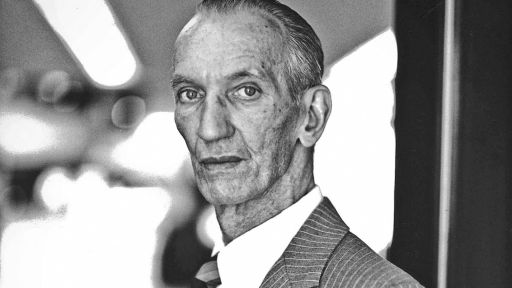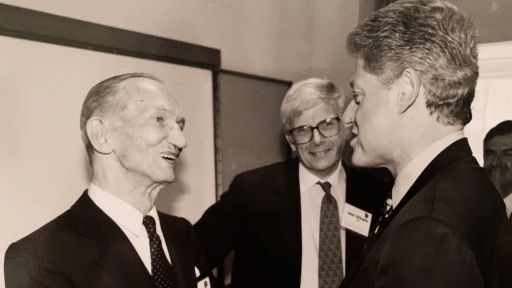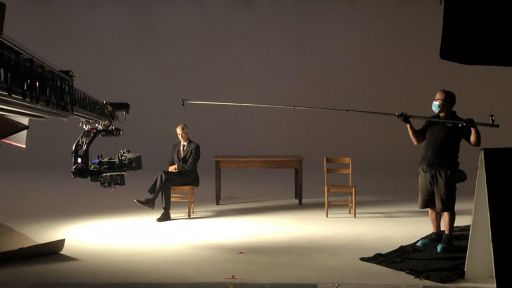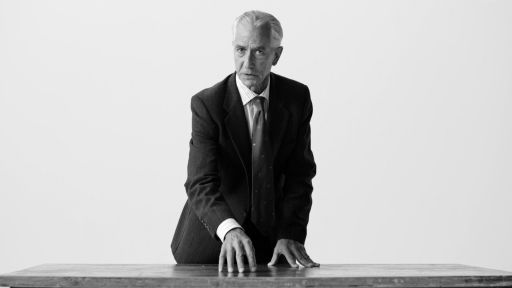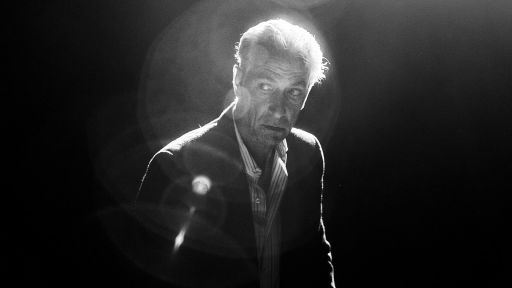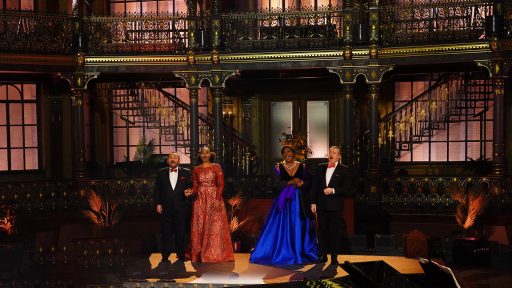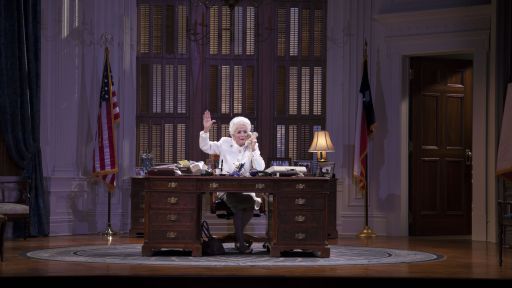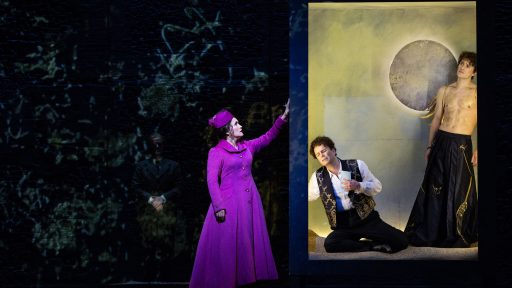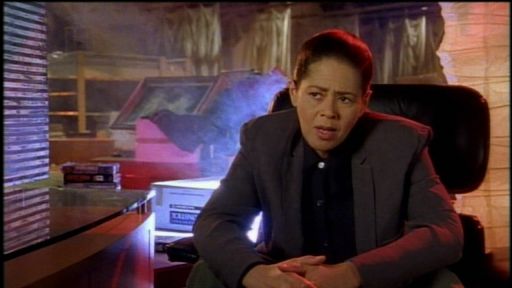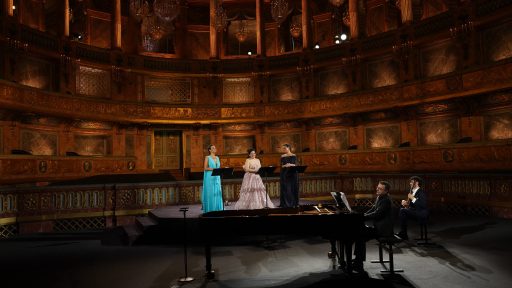TRANSCRIPT
♪♪ -Next on "Great Performances"... David Strathairn stars in the true story of Holocaust witness and reluctant World War II hero Jan Karski.
-Messenger of the Polish people to their government-in-exile.
Poland is the whole world to me, and that whole world is destroyed.
"You are going to be taken to labor camp, where you will work.
If you attempt to escape, you will be shot."
Messenger of the Jewish people to the world.
We enter the ghetto through this tunnel.
Tell them over there in London and the United States that you saw it.
If there is no effort at Allied intervention, within the year, the Jewish people of Poland will cease to exist.
-David Strathairn's powerful solo performance is followed by a behind-the-scenes exploration of Karski's life and work.
-So, here is a man who alerted the world to genocide as it was taking place.
-"Remember This" is next.
[ Footsteps approaching ] -We see what goes on in the world, don't we?
Our world is in peril.
Every day it becomes more and more fractured, toxic, out of our control.
We are being torn apart by immense gulfs of selfishness, distrust, fear, greed, indifference, denial.
Millions are being displaced, impoverished, denied justice simply because of who they are.
Beaten, murdered, silenced, forgotten.
We see this, don't we?
How can we not see this?
So... What can we do?
What can you do?
What can I do?
What can we do that we are not already doing?
Do we have a duty, a responsibility as individuals to do something?
Anything?
And how do we know what to do?
How do we know what we are capable of?
It's not easy knowing.
Human beings have infinite capacity to ignore things that are not convenient.
♪♪ ♪♪ -Now -- Now I go back 35 years.
No, I don't go back, you know.
[ Sobs ] [ Sobs, speaks indistinctly ] ♪♪ ♪♪ ♪♪ ♪♪ ♪♪ ♪♪ Jan Karski, born Jan Kozielewski, 1914.
♪♪ Messenger of the Polish people to their government-in-exile.
♪♪ Messenger of the Jewish people to the world.
♪♪ A man who told of the annihilation of the Jewish people while there was still time to stop it.
♪♪ Hero of the Polish people.
♪♪ Professor, Georgetown University, 1952 to 1992.
And always... [ Polish accent ] ...immaculately dressed.
Now I go back.
In my class that is on government and politics, I tell my students, governments have no souls.
They have only their interests in mind.
Individuals have souls.
The common humanity of people, not the power of governments, is the only real protector of human rights.
So...
I ask you, what is your duty as an individual?
Every generation takes on a new revolution.
Szmul Zygielbojm -- remember his name.
This man loved his people more than he loved himself.
Zygielbojm shows us this total helplessness, the indifference of the world.
What we are witnessing now is very discouraging.
Every generation brings destruction, partition, violence, and yet there is this desire to preserve language, identity, culture.
As a boy in Poland, we had to learn many languages because we never knew who would take us over.
For 35 years, I have never mentioned, even to my students, that I took part in the war.
I wanted to forget that degradation, humiliation, and that dirt.
I was forgotten and I wanted to be forgotten.
One day, 1978, I am discovered.
A man knocks on my door.
[ Knocking ] A filmmaker.
His name, Claude Lanzmann.
And he is very full of himself.
He likes to brag.
"Making this film, it will be the greatest film ever made about the tragedy of the Jews.
It will be called "Shoah," and it will be as long as it needs to be to tell what needs to be told.
And, Professor Karski, you will be in this film.
There will be no actors, no Hollywood nincompoops, only perpetrators, victims, witnesses.
And you are in the third group.
I will have an interview with you."
"No, no.
You will not have an interview with me.
I am out of it."
But I remember he is a bit of an authoritarian.
He is very, very pushy.
"Professor Karski, look in the mirror.
You are old man.
You are going to die soon.
You have historical responsibility.
It is your duty to speak."
He convinces me.
I made a fool of myself.
I broke down a few times.
It was the first time that I was involved again in that experience.
My wife, Pola, can't stand it.
We never discuss the war.
"Jan, you torture yourself.
You have done your job.
It does you no good."
She leaves the house and walks for four hours.
She is a dancer.
She never stands still.
Lanzmann asks me questions.
"Do you think you have succeeded in your report to the world?
Do you think you have succeeded in conveying the magnitude?
Professor Karski, you are unique witness.
You are a hero."
No, no.
I am insignificant little man.
Hero?
No.
People in Poland were not happy that I took part in that film.
They say it does not reflect kindly on my country.
♪♪ I was born in Lodz -- at that time, one of the most multicultural cities in all of Europe, where whether you were happy or unhappy, you always hear bells.
[ Bells tolling ] I remember my grandmother gives me a bicycle.
"Jasiu," she says, "Take this, see the Polish countryside as it is now."
I ride east to west.
Everywhere I go, "Witam!
Witam, Jasiu!"
"Dzien dobry!"
"Powodzenia!"
[ Chuckles ] "Good luck."
By American standards, we are rather poor.
My father, Stefan Kozielewski, has small factory producing saddles, women's bags, leather goods.
I barely remember him.
He dies when I am very young.
My mother, Walentyna Kozielewska, she wants me to be a diplomat, ambassador of Poland.
I listen, I work hard.
Everybody says I have excellent memory and I am a good boy.
My mother, very, very Catholic.
Devotion, respect for others.
She is making us in her image.
I remember when they took me to be baptized, she tells me that my father, my godfather, and my priest, all of them were drunk.
[ Chuckles ] She is disgusted, but this is Poland.
In America, people drink to be in better mood.
In Poland, we drink to get drunk.
Now I think every conversation would be better with a Manhattan.
In our apartment house, I remember in the yard there are some boys, children who my mother calls bad boys.
They would sneak over the roof and throw dead rats.
Bad boys, bad Catholic boys.
Teasing the Jews, throwing dead rats at Jews.
"Jasiu, keep watch like a good Catholic boy.
Go to the Sukkah, where the Jews pray, and you will watch.
If someone comes, simply call, 'Mamo, Mamo,' and I will take care of it."
And I watch.
My best friends in school are Jewish.
They help me with science, I help them with Polish literature and history.
Izio Fuchs, extremely religious.
Everybody calls him Jewish prophet.
He starts every sentence, "I say."
Another one, Lejba Ejbuszyc, is abject poverty.
Is a fighter full of resentment, hatred.
He must have been treated badly.
Izio tells us, "I say, we have to be friendly with Lejba because if he doesn't find friends with us, where will he find friends?"
Izio's younger brother Salus.
Everybody loves Salus, but I like him most of all.
He wants to be a pianist, but I can never get him to play the piano for me.
I don't know what happens to them.
My mother always says, "Jasiu, climb the ladder and nothing will stand in your way.
Go.
Go."
And I leave Lodz for university to study law and diplomacy.
After graduation, I am invited to attend a youth rally in Germany.
[ Crowd cheering ] Thousands of faces, somehow all the same.
Tremendous hullabaloo.
Tremendous the hall, like a concert, like a circus.
Darkness.
Shock.
Nothing is happening.
Then the sun descends on one point alone.
A man, medals on his chest.
Light glowing around him.
That is Hermann Goering.
"You have to take responsibility for the human race, because you belong to the superior race.
We are destined to govern, to bring order to the world.
To create the lasting peace, and only the honest peace and youth of Germany can create such peace!
Sieg Heil.
Sieg Heil!
Sieg Heil!"
[ Rhythmic footsteps ] What is happening?
That was Goering.
It is enough to make someone dizzy, the noise, the lighting.
But I think maybe they are superior.
To govern the whole world is a pretty overwhelming proposition, yet it sounds like fun to them.
Why couldn't I be born German, I wonder, so I could to be superior too?
To me, at this moment, they represent Western civilization.
I go to Geneva to learn French, to London to learn English.
It's very, very difficult.
I work a low-level job in the Polish embassy, but I feel...
I have a longing for home.
One evening, I go to the theater.
Evening of Polish folk dance.
♪♪ Alone onstage, dancing barefoot, a girl, a Polish girl of outstanding beauty.
Her name is Pola.
[ Chuckling ] Polish girl named Pola.
Pola Nirenska.
Mm.
A girl in exile here, far from home.
I wonder what story she is telling with such urgency, such freedom.
I have never experienced this form of expression before.
It's amazing.
Beautiful.
[ Applause ] I return to Poland, to Warsaw and join the diplomatic service.
If my mother were still alive, she would be very, very proud.
I want to represent my nation.
I love my country.
I am a proud citizen of a big empire.
Slip of paper, secret mobilization order.
"Polish army needs you.
Settle your affairs and report to the train station in two hours."
Sent to the German border in a crisp khaki uniform with unbridled optimism.
"Death to Hitler.
Niech zyje Polska!
Long live Poland.
Ah, we can finish this alone."
[ Train brakes hiss ] A town called Oswiecim -- in German, Auschwitz.
Later infamous, but now, 1939, just an ordinary place with a brilliant, cloudless sky.
September 1st, 5:05 in the morning -- time for a shave.
[ Explosion ] It comes out of nowhere.
The Germans bomb our camp.
Men are dying.
I retreat.
I crawl back to the station.
[ Airplane engines roaring ] [ Gunshots ] I don't even know who is firing, who is on our side.
♪♪ Total devastation.
Chaos.
The Blitzkrieg.
I see the destruction of everything I have believed in.
Poland is strong.
Poland is an empire.
Poland is the whole world to me, and that whole world is destroyed.
Everything I have believed in up till now no longer applies.
Poland loses the war in 20 minutes.
I walk, a refugee.
♪♪ It is summer, and the heat is terrible.
We don't know where we are going.
Thousands with no place to go.
Who will take us in?
I try to walk on the softer sides of my feet.
They are so blistered.
15 days, I walk.
I see tanks, the hammer and sickle.
Soviets have entered Poland.
A Polish captain waves a white handkerchief.
They take us to labor camp.
We sleep in a warehouse beneath the Red Star and a portrait of Stalin.
We shiver in the raw autumnal wind.
Barbed wire encircles us.
"Cold?
Are you Poles cold?
That's because your bones are hollow and your blood runs weak.
Exploiters, bloodsuckers.
You will learn how to work in Russia.
Your backs will ache, your hands will bleed, your fingernails will break open, but you will learn how to work."
For four weeks, I learned how to work.
I see opportunity.
There is coming an exchange with the Germans.
Approach a Russian officer.
"Sir, the men have been speaking about an exchange."
"What?
You don't like it here?"
"I love it here.
I would like to stay here, but my wife is expecting our first child.
I want to return to Lodz to be with her."
I am sure he realizes I am lying.
This, for me, is a lesson.
There is no such thing as good nation, bad nation.
Each individual has infinite capacity to do good and infinite capacity to do evil.
We have a choice.
I lie, I survive.
The others will be taken to the edge of a pit and shot in the head, stacked neatly in mass graves.
22,000 in the massacre in the Katyn forest.
♪♪ Radom -- military base in occupied Poland.
A model Nazi facility.
We eat tiny amounts of inedible food.
We sleep on the cold, hard November ground.
No overcoats, no blankets.
Every day, deaths come from exposure and disease.
I see how common and lightly regarded death can be.
"Polish swine, you are going to be taken to labor camp where you will work.
If you attempt to escape, you will be shot.
If you create disturbance, you will be shot.
Load the swine onto the train."
[ Train horn blows ] ♪♪ ♪♪ "Citizens of Poland, I am going to jump from this train.
War is not lost.
We are not defeated.
Join me if you are willing to take the risk.
I need three men to lift me up and push me out at a point along the tracks where there is no light."
"Why would we help you?
The Germans will shoot the rest of us."
"We are young men, some only 18.
We must not spend our lives as German slaves.
Are you or are you not a Pole?"
♪♪ [ Music intensifies ] [ Train horn blows ] [ Train passing ] I jump from the train.
I am no James Bond.
I do what I have to do.
I escape.
Again, I walk.
100 miles.
Thousands along the road, silent, exhausted.
Everywhere, devastation left by the Blitzkrieg.
Warsaw...
Shocking ruin of its former self.
Street after street heaped with rubble and debris.
Cafes, theaters, libraries, churches, vanished as if they never existed.
Graves for the dead, improvised in parks and public squares.
There is no longer the Poland.
Yet irrationally, some part of me believes a fragment still exists.
Something must be occurring.
"Jan!"
"Jan!"
"Not every Pole has resigned themself to fate.
We must fight if we want to exist.
Come, come.
Walk through this door."
"Come in, young man.
Come in.
Oh, we have no doubt that you are faithful, that you are a patriot.
We hear you know languages, you know your way around Europe, and you have a photographic memory.
Read this paper.
Memorize it, then destroy it.
You will have a new name, a new skin, a new mode of existence.
You will call yourself Witold Kucharski.
Poland needs you.
Walk with us, brother.
Join the Polish Underground."
There is nothing extraordinary about it, nothing at all romantic.
It comes as a result of a simple raising of my right hand.
"In the name of the motherland..." "In the name of the motherland, I swear before God, his son, and the holy spirit, that I will not divulge any of the information which I am about to receive.
I swear to God that even under the most extreme circumstances, even unto death, I shall remain faithful to the Polish nation."
"By the oath you have just taken, you are now a member of the Polish Underground."
I become a tape recorder, camera, messenger.
My first mission -- to see the Polish countryside as it is now.
To collect information in Lodz, Lublin, Belzec, then proceed to France and report there to our government-in-exile.
I will report what I see.
♪♪ Lodz -- December 1939.
All the streets, shops, offices have only German names and are flooded with German flags, slogans, posters.
Poles cannot travel by automobile.
They are even forbidden to own a bicycle.
No matter where you turn, you hear only the German language.
Lodz is no longer Lodz.
Lodz is Litzmannstadt.
I report what I see.
♪♪ Lublin.
A lesson is taught, German to Jew, in gymnastics and hygiene.
Dozens of young men, women, and children forced to sing those humiliating Nazi songs, doused with cold water in the freezing weather.
People faint from shock and exhaustion.
Young boys are stripped naked, mocked, and abused by the guards.
I report what I see.
♪♪ Belzec.
The Germans have created a camp of Jews.
All are frozen, in despair, unable to think, hungry.
This has been going on for weeks.
I report what I see.
♪♪ January 1940.
My report.
The situation.
The Jewish problem in the homeland is clear, uncomplicated, and easy to understand.
Polish Jews, at least in the western area, are intended for destruction or removal.
The Polish government does not release my report to the public.
Next mission, mountains of Slovakia.
15 miles to safety.
I am tired of walking, but my guide says we must keep moving.
Gestapo everywhere on the lookout.
My feet are swollen.
I must get some rest.
We reach a humble cottage.
3:00 a.m. [ Loud bang ] [ Gasping ] "Hands up!
Where is your knapsack?
Are you hiding anything?"
"No.
No."
Ah!
They break my jaw.
Fist, truncheons.
Teeth spilling from my mouth.
Ah!
Broken ribs.
They are beating me for two days.
"Tell us.
Tell us!"
Hoses behind my ears.
[ Groans ] My genitals.
They are beating me, beating me, beating me within an inch of my life.
♪♪ [ Distantly ] "Jasiu?"
[ Bell tolling distantly ] "Jasiu, you have something to share?"
"Jasiu, your classmates are waiting."
"A poem by Mickiewicz."
"Do you need your paper?"
"No.
I remember."
"A tragic lonely terror grips my heart.
A longing for some peaceful, gentle place and memories of youthful love I trace, unto my childhood home, I long to start."
[ Door creaks, slams ] A resplendent Nazi youth enters my cell.
"Witold Kucharski?
Ah, we don't usually get your type here.
You have culture and breeding.
If you had been born German, you would be very much like I am.
Cigarette?
Brandy?"
"I know who and what you are.
You are carrying information from the Underground to your leaders in France.
You must enable us to get in touch with your authorities.
If you love your country, you will not reject this proposition.
Very soon, the Fuhrer will dictate peace in London.
A few years, he will proclaim the new order on the steps of the White House in Washington.
The new peace will be permanent.
We don't want to harm anybody.
With the exception of the Jews, of course.
They will be exterminated.
For your loyalty to the Third Reich, we will permit participation in our new civilization.
Do you accept my proposal?"
"I am insignificant little man.
You overestimate my importance."
"You are nothing but a dirty little coward.
Polish swine."
[ Grunts ] [ Weapon cracking ] Aah!
Aah!
♪♪ [ Bells tolling distantly ] [ Distantly ] "Jasiu..." "Jasiu... this is an offering of peace and safety.
Not everyday safety, but the most supreme safety.
Safety in God.
I present you, child of Poland, with Christ's body to carry with you on your journey.
It will protect you from all evil and harm."
[ Cell door slams ] [ Whimpers ] No, no, please.
I can't take anymore.
I know too much.
All the names, all the addresses, and I swore I would never break, never disgrace my Poland.
Here I die a wretched, inglorious death like a crushed insect.
Family, friends will never even learn what has happened, where my body will lie.
In my shoe, I have concealed a blade.
Plunge the blade into my right wrist.
My beloved motherland, I love you.
Saw back and forth.
My beloved motherland, I love you.
Slam the wrist down onto the blade.
My beloved motherland, I love you.
Slash, slash!
I am trying to cut my veins, but it is not so easy.
They are very hard, the veins.
The blood is running, but it has stopped, so I am waving, waving, waving, but...
I fail.
♪♪ Let me die.
Please let me die.
Let me die!
"Shh, shh, shh!
Don't be frightened.
You are in a Polish hospital.
The Gestapo don't want you dead.
They brought you here.
They think you will break.
They'll come back, but we will not abandon you.
Poland still needs you.
You are going to be set free tonight.
We've bribed the guard.
At midnight, a doctor will pass this room and light a cigarette.
Take off your gown, move down the corridor.
You will find a rose on one of the window sills.
Jump from that sill.
Men will be stationed down below.
Is everything clear?"
"Yes, I understand."
[ Bell tolls ] Church clock tolls midnight.
Look, a figure.
Shadow, match, cigarette.
The signal.
♪♪ ♪♪ Draft of cold air.
The rose.
The window is open.
Now is the time.
Jump.
Jump.
"What are you waiting for?
Jump!"
[ Suspenseful music plays ] ♪♪ "Get him to the water!"
I'm thrown into a canoe, wrapped in a freezing blanket.
All I hear is paddling, paddling.
[ Water lapping ] "End of the line, Witold.
This is where we separate.
No more contact.
You will spend some time away, an old estate.
It's nice."
"Oh, th-thank you."
"Don't be too grateful.
We had two orders.
The first was to help you escape.
The other was to shoot you if we failed.
You were lucky."
The ones who save me, 32 Poles, doctors, nurses -- they are tortured by the Germans all summer long.
No one gives in.
So they are lined up and shot to death.
♪♪ ♪♪ ♪♪ A small farm in the Polish countryside.
♪♪ I breathe the clean, fresh air.
♪♪ ♪♪ I melt into the landscape.
♪♪ I pretend to be a gardener.
I hardly recognize myself.
Seven months of healing... ...but I regain my strength.
Even in the heat now, I always wear sleeves.
But I am restless.
In my sleepless nights, I listen to love songs on the gramophone and I read Kafka.
"Far, far from you, world history is unfolding.
the world history of your soul."
World history of my soul.
Governments have no souls.
Individuals have souls.
♪♪ That barefoot dancer in London, that Polish girl, Pola, Pola Nirenska... she too was far from home.
Always moving.
I am useless here.
I must do something.
Polish resistance is growing.
Nationalist Party, Socialists, Peasant, Christian Labor.
I return to work to carry their messages.
They are sending me to London to report to the Allied nations.
The Allies must know that the Polish people are placing our hopes in them.
Before I leave, a message.
Jewish people have their own Underground.
They have learned about my mission.
I agree to one last meeting.
♪♪ ♪♪ [ Wind rushing ] [ Knocking ] An old house on the outskirts of Warsaw.
Cold.
Twilight.
♪♪ I sit in a rickety old armchair.
♪♪ Two men, Jewish leaders, walking through the room, and they do not give their names.
Nobody gives their names.
Less like men... incarnations of my suffering and nerves.
Shouting.
"We know about you, Witold!"
Whispering.
"We know about you."
Walking, walking through the rooms.
Nightmarish.
"We know about you.
We know you are going to London.
We know you are carrying messages.
Jewish people have messages, too."
"Ah, he will not understand."
"We know that in London and in Washington and in New York, that it is impossible for them to believe what is happening to us, that they believe that we are exaggerating, that we are hysterical.
They are not doing enough.
We are being systematically murdered.
We cannot defend ourselves, and no one in Poland can defend us.
This is what the people do not understand.
Our representative in London is Szmul Zygielbojm.
He tells us that he is doing everything he can to help us, but it is not enough.
We are dying here.
Let them do something that will force the world to believe."
"Ah, he doesn't understand."
"Tell Zygielbojm that the Jewish people must do something to make the rest of the world believe us.
We are all dying here.
Let them die too.
Let them crowd the offices of Churchill, Roosevelt, and all the Allies.
They should stand in the street and refuse food.
They should refuse water.
They should proclaim a hunger strike and die in view of all mankind.
Let them die a slow death while the world is looking on."
"No, he doesn't understand!
His cities will be rebuilt, his wounds will heal.
Ah, what's the good of talking?
No one in the outside world can possibly understand."
"From this ocean of tears, pain, rage, humiliation, Poland will emerge again, but the Polish Jews will no longer exist.
Hitler may lose his war against the Allies, and yet he will win his war against the Polish Jews.
Young man, it has never happened before in history.
Pharaohs did not do it.
Babylonians did not do it.
We have very little time.
Unless the Allies take unprecedented steps, we will be totally exterminated."
"We can organize for you to visit the Jewish ghetto.
We can organize for you to visit the Jewish camp.
I know the western world, Mr. Witold.
I am sure it will strengthen your report if you are able to say, 'I saw it myself.'
Now, of course, you may say no, but I will go with you.
I will be sure that you will be as safe as possible.
Who knows?
Perhaps this will shake the conscience of the world.
Will you do it?"
♪♪ ♪♪ We enter the ghetto through this tunnel without any kind of difficulty.
I am not disguised, he is not disguised.
I wore the star of David.
He put it on me.
So, we walk in the streets.
He is on my left.
We do not talk very much.
So, now comes the description of it, yes?
Naked bodies on the street, corpses.
I ask him, "Why are they here?"
"Well, Mr. Witold, we have a problem.
If a Jew dies and the family wants a burial, they have to pay tax on it, so they just throw them in the street."
Women with their babies, publicly feeding their babies, but they have no breast, just flat.
Babies with crazy eyes, looking.
It is not a world.
It is not humanity.
Streets full.
Apparently, they all live in the street.
Everybody offering something to sell.
Three onions, some cookies.
Selling, begging each other, crying, hungry.
Some children running by themselves or with their mothers sitting.
It is not humanity.
It is some... some hell.
We leave the ghetto.
Then he says to me, "You did not see everything.
Will you go again?
I want you to see everything."
Next day, we go again.
Same way.
Now, I am more conditioned.
I notice other things.
Stench.
Terrible, terrible stench everywhere.
It's suffocating.
Dirty streets, dirty, nervousness, tension, bedlam.
This is Plac Muranowski.
In one corner, children playing with rubbish, throwing rubbish to each other.
He says, "They are playing.
You see, life goes on.
Life goes on."
They are simulating playing.
They do not play.
We just walk in the street.
We do not talk to anybody.
We walk probably for one hour.
Sometimes, he tells me, "Look at this Jew."
A man standing, not moving.
Is he dead?
"No, Mr. Witold, he is alive.
But remember, he is dying.
He is dying.
Tell them over there in London and the United States that you saw it.
Don't forget."
We walk again.
Only from time to time he whispers, "Remember this.
Remember this.
Remember this."
I ask him, "What were they doing here?"
"They are dying.
That's alright.
They are dying.
They are dying."
And always, "Remember.
Remember."
Suddenly, some movement starts.
People are running, fleeing from the street.
We jump into some apartment house.
He pushes me to the window, says, "Look, look."
Two boys, nice-looking boys, Hitler youth, soldiers, laughing, talking to each other in the street.
Suddenly, one boy reaches his hip pocket.
A pistol.
And then, without even thinking, takes aim, target... [ Gunshot ] A scream.
"Aah!
Aah!"
The other boy is saying something to him, congratulating him, patting him on the back, and they walk away.
A woman puts her hand on my shoulder.
Perhaps she recognizes that I am not a Jew.
She embraces me and says, "Go, go.
This doesn't do you any good.
Go."
It was not part of humanity.
I was not part of it.
I did not belong there.
I have never seen such things.
I never saw any movies.
I never saw any -- any theater.
Nobody ever wrote about this kind of reality.
I was told that these were human beings, but they did not look like human beings.
We leave the ghetto.
And then he says to me, "Mr. Witold, we have organized for you to visit a Nazi camp.
You will be in the company of Ukrainian militiamen.
Powodzenia.
Good luck."
He tells me I am going to see something which I have never seen and which I will never forget, and I am going to see a camp now, actually a camp.
Now, Jewish ghetto is not a camp.
It is only degradation, a way to death.
I am going to see a death camp now.
♪♪ I enter the camp wearing the uniform of a militiaman.
I remember the militiaman says something -- "There is a new batch which is going to be processed today."
Now, from the main gate, I see a cattle train and I count 46 trucks.
There is a platform, a ramp, leading from the main gate to the trains almost directly.
Now, on the train floor, there is this whitish power.
I ask the militiaman, "What is this?"
"It is for their hygiene, and this is quicklime so when they die, there will be no problem.
They will not contaminate the air whatsoever.
Himmler said, 'The Jews will die and they will die in agony.'
They will die.
Don't worry.
They will die."
Now, in this part of the camp, and I don't know how many, it must have been 5,000... 4,000, 6,000.
It -- It cannot be described.
Not humanity.
Crowds, some collective moving body, the Jews, women, children, men shouting, quarreling, fighting against each other.
A man totally, completely naked, just standing there.
Why -- Why is he naked?
I don't know.
Perhaps he threw his clothes, perhaps some people took his clothes.
Just standing there in this agony.
Now, at this time, I am strong.
I understand my mission.
I am not supposed to have any feelings.
I am a camera.
There is a crowd out of reality.
A crowd with many heads, legs, many arms, many eyes, but it is like some -- some collective, pulsating, moving, shouting body.
I am observing this.
I do not want to see them as humans.
I control myself.
20 minutes, a half hour, I don't know, however long I stand there.
I do not want to have any feelings.
I do not have any feelings.
I am just seeing something which I am supposed to report.
It's a horrible, horrible scene.
Those shouts, despair, mothers dragging their children to the trucks, but they cannot reach.
They are too weak.
And behind them, Gestapo, militia, pushing, pushing them.
"Raus!
Juden raus!"
Beating them like pigs, like nonhumans.
Starving, hungry, crazy, mad.
I-I see their eyes.
This is some organism with many heads, and legs, eyes, noses.
And I control myself.
I realize, again, no feelings.
Just look, no feelings.
Look, no feeling.
But then I can't help it.
It comes too deeply into me.
They're humans!
There are individuals here.
And then I lose control.
I realize I don't know what I should be doing.
I might jump some Gestapo and start fighting.
I might go with the Jews to the train.
I realize things are out of control with me, and I leave the camp.
I ask a store owner, "Could I use your kitchen?"
I am crazy.
I'm insane.
I enter the kitchen, and as if in a -- I don't know -- self-preservation, animal, I actually start to disrobe myself and start to wash myself with soap.
Everything, I am washing myself.
I remember I am washing my shoes.
I start to wash my shoes and the store owner comes in, and I ask just one question, "May I stay the night?
I cannot go back."
"Sure.
You may spend the night."
♪♪ You may consider what I say some ancient, terrible myth.
It is rather unreal, difficult to visualize.
The mind cannot absorb that it is real, that it really happened.
It becomes a myth.
All I can say is that I saw it, and it is the truth.
♪♪ 21 days to London, in disguise.
A train takes me from Warsaw to Berlin, then Brussels, occupied Paris, then across the Pyrenees Mountains on foot in the snow.
Madrid.
A plane takes me to London.
♪♪ I report to Szmul Zygielbojm.
"I was told you wanted to see me.
Well, what do you want?"
"Mr. Zygielbojm, I don't want anything.
I have messages."
"Are you Jewish?"
"No."
"So, talk.
Talk.
You're here to talk, so talk."
I give him all the material, and then, with, like, hatred, frustration, he says... ..."I know of this already.
My family is there.
You haven't told me anything I don't already know.
So, what can I do, hm?
What can I do that I am not doing?
I do everything.
I do everything that is possible.
So, what can I do?"
I close my eyes and I give it to him.
"Jews are dying.
There will be no more Jews.
What's the use of having Jewish leaders?
Let the Jews go to the most important offices, Allied offices.
Let them demand.
If they are refused, let them go out.
Let them stay outside.
Let them refuse drink.
Let them refuse food.
Let them die.
Let them die a slow death.
Let humanity see it.
Perhaps it will shake the conscience of the world."
And then he jumps.
"Madness, madness, madness!
They are mad.
They are mad.
The whole world is mad.
They are crazy.
They don't understand anything.
They will not let me die.
They will send me to policemen.
They will arrest me.
They will take me to asylum.
They will feed me artificially.
They are mad.
Everybody's mad.
So, I have to do something, but I don't know what.
So, what can I do?
I have to do it, but I don't know what.
So, what can I do?
This is a mad world.
Everybody is mad.
I have to do, I don't know what.
So, what to do?"
♪♪ Now, this may seem cynical, but at this time, I am a machine.
28 years old, my life consists of moving from one contact to another, eating, sleeping, reporting.
All those I am reporting to are very important people, and I am an insignificant little man.
My mission is important.
Now, perhaps this shows that I am, in a way, morally corrupted, but in the second part of our meeting, I can only think of one thing.
"Mr. Zygielbojm, Mr. Zygielbojm...
I'm sorry, but I am going to be late for my next appointment."
[ Air raid sirens wail distantly ] Six months in London.
My own apartment.
Evenings of air raid sirens, Luftwaffe overhead.
Foreign Secretary Anthony Eden informs me that Polish reports of these atrocities have already reached them.
"The matter will take its proper cause," he says.
"May I report to Prime Minister Churchill?"
"No, I will not permit you to take his time."
When Churchill speaks to Parliament in 1946, he says that he had no idea of the scale of the horrible massacres which had occurred, the millions and millions who had been slaughtered, that it dawned on him gradually after the war was over.
I am sent to America, secretly.
I still remember the Statue of Liberty emerging from the New York Harbor.
In Washington, I stay at the Polish embassy.
Polish Ambassador comes with Justice Felix Frankfurter.
He is a little man.
He does emanate some brilliance, very alive in his eyes.
He calls me "young man."
"Young man, do you know who I am?"
"Yes, you are associate justice of Supreme Court."
Silence, then Frankfurter starts.
"Mr. Karski, young man, I have been invited by my very good friend, your ambassador, to come here to see you.
I was also advised that I should see you.
Apparently, you have some information which I should know.
Young man, do you know that I am a Jew?"
"Yes.
Mr.
Ambassador told me this."
"Well, tell me about the Jews.
We have here many reports.
What happens to Jews in your country?"
What happens to Jews in my country... Now I become a machine.
The man sits.
I report.
Jewish leaders.
Ghetto.
Camp.
15, 20 minutes pass.
He does not interrupt.
I stop.
I remember he looks smaller, smaller.
He is looking at the floor.
"Young man, as I mentioned, I have been informed about your activities.
I was told that you came out of hell.
My admiration for people like you..." And now... "Young man, I am no longer young.
I am a judge of men.
Men like me, talking to men like you, must be totally honest.
And I am telling you, I do not believe you."
Ambassador breaks in.
"Felix, what are you talking about?
He was checked, rechecked 100 times.
Felix, he is not lying."
"Mr.
Ambassador, I did not say he was lying.
I said I do not believe him.
These are different things.
My mind, my heart are made in such a way that I cannot accept it.
I know humanity.
I know men.
Impossible!
No.
No.
No!
♪♪ ♪♪ "Prime Minister Churchill, President Roosevelt, in the name of the Jews who are being murdered in vast numbers behind the gates of the ghetto, I turn to your governments with this last desperate appeal.
Of the three and a half million Jews from before the war, there now remain alive no more than a few thousand.
The surviving Jews of Poland beg you to find the means to save them."
"Try to imagine the people who see their loved ones dragged away to their deaths every day, and each one knows that their turn must come.
Imagine the great crime of methodically massacring an entire people.
The conscience of every person must be shaken by the greatest crime in human history.
I call on all people to erase the burning shame which is directed at the human race.
Force the Nazi murderers to stop the systematic massacre of a people.
Szmul Zygielbojm."
♪♪ A limousine picks me up and takes me to the most powerful man in the most powerful nation in the world.
Ambassador tells me, "Johnny, you are inclined to talk too much.
Poland is of minor concern to him.
He has the whole world.
Be precise."
Ambassador punctual.
President punctual.
Secretary leads me to his office.
I see him.
He looks like a world leader.
Yes, a world leader.
As a matter of fact, it strikes me he is more than the president of the United States.
I see a lord of humanity.
A lord of humanity.
He sits behind his desk.
Behind him, of course, all American flags.
Very impressive.
A whole wall covered with them.
Very high chair.
I was warned he will not get up to shake my hand.
He shakes my hand.
"All hope, Mr. President, has been placed by the Polish nation in the hands of Franklin Delano Roosevelt."
I am thinking how much time I have.
I want to pin him down.
"Mr. President, I am returning to Poland.
Every leader will know that I spoke to President Roosevelt.
Sir, everybody will ask, 'What did the President tell you?'
Mr. President, what do I tell them?"
"You will tell your leaders that we shall win this war."
Long cigarette -- cigarette holder.
"Win this war.
The guilty ones will be punished for their crimes.
Justice, freedom shall prevail.
United States will not abandon your country."
Now I come to the Jewish problem.
"Mr. President, before leaving Poland, I met with the most important Jewish leaders.
They organized a visit to the ghetto.
I saw a camp.
Mr. President, the situation is horrible.
More than one million eight hundred thousand Jews have been murdered in my country.
I have brought with me the official declaration of my government.
If there is no effort at Allied intervention, within the year, the Jewish people of Poland will cease to exist."
Now he asks me questions.
Do you know the questions he asks?
"Do I understand correctly, young man, that before the war, Poland was essentially an agricultural country?"
"Yes, Mr. President.
It was so."
"From what we understand of the Russian campaign, the Germans had to use a tremendous amount of horses.
Did they take those horses from Poland?
Because with your agricultural economy, you need horses."
"Mr. President... yes..." He does not ask one single specific question about the Jewish problem.
"Your story is very important.
I'm glad I heard it.
I'm sorry, I am half hour late for my next meeting.
I wish you success and happy return to your country.
I hope you will come back to America."
I do not go back to Poland.
I can't.
I am deciphered.
I am known, and I know too much.
When the war comes to its end, I learn that the governments, the leaders, scholars, writers said that they did not know what was happening to the Jews, that the murder of six million Jews was a secret.
They knew.
Public opinion knew, at the time.
Governments knew.
Intellectuals knew.
Even if they didn't know, it was only because they didn't want to know.
Jewish problem was insignificant.
The Jews were left alone to perish.
My faith tells me that the second original sin has been committed by humanity.
Through commission or omission or self-imposed ignorance or insensitivity or self-interest or hypocrisy, heartless rationalization, or outright denial, this sin will haunt humanity to the end of time.
It haunts me now, and I want it to be so.
♪♪ ♪♪ ♪♪ ♪♪ "To His Excellency, the President of the Republic of Poland.
Mr. Prime Minister.
I cannot continue to live and be silent while the remnants of Polish Jewry, whose representative I am, are being murdered.
By my death, I wish to give expression to my most profound protest against the inaction in which the world watches and permits the destruction of the Jewish people.
My life belongs to the Jewish people of Poland, and therefore, I hand it over to them now.
I yearn that what remains of the millions of Polish Jews may live to see liberation together with the Polish masses.
That this liberation shall be permitted to breathe freely in Poland, in compensation for the inhuman suffering and torture inflicted on the Jewish people.
And I believe that such a Poland will arise and such a world will come about.
I take leave of you with greetings from everybody and everything that was dear to me and that I loved."
"Szmul Zygielbojm."
The suicide of Zygielbojm, May 11, 1943, for me, shows more than anything else, the Jewish tragedy of the Second World War.
About him I speak.
He shows us this total helplessness, the indifference of the world.
The indifference of the world.
I have not had one single class in all my years of teaching, when I come to the war situation, I do not tell my students, "There was Zygielbojm!"
♪♪ There are voices still that say the Holocaust never happened, that it was an exaggeration.
These voices are weak.
They have no future.
Now, I always dedicate one class to speak about what I saw.
I tell my students we have a future because we are speaking the truth.
My wife, Pola, also a teacher.
That barefoot dancer in London, remember?
I see her again 20 years later, dancing in a Washington synagogue.
Remarkable.
I find her address, send a fan letter.
"Would you like to go out on a date?"
Nothing.
A few weeks go by, I find her number.
"Dinner?"
"No," she says.
"But I'll go to lunch."
Jewish girl studying dance in Germany.
Hitler came, she moved to Italy.
Mussolini came, she goes to London, then Washington.
Throughout the war, she never stopped dancing.
She taught in our home, our basement.
We made a heated floor for her students, a happy, light atmosphere.
But she stopped.
It was tiring, and she was not well.
But she was not done.
A final performance at the Kennedy Center.
She didn't want me to go, but of course I am going.
[ Indistinct conversations ] [ Applause ] ♪♪ ♪♪ "In memory of those I loved who are no more."
She left her family in Poland.
72 of them.
They all perished.
Pola could only experience the Holocaust in her imagination.
She took her life.
A fall from our balcony.
She would tell her students, "Look around.
Notice people.
Pay attention.
Pull all reactions to them into choreography."
When I left the White House on that day in 1943, President Roosevelt was still smiling and fresh.
I felt fatigued.
It was, however, not an ordinary fatigue, but rather the satisfied weariness of the workman who has just completed his job with the last blow of his hammer or the artist who signs his name under the completed picture.
Something was coming to an end, and all that was left was this weariness.
♪♪ [ Normal voice] He sat down on a bench and he watched people go by.
They were well dressed and they looked healthy and complacent.
They hardly seemed affected by the war.
Events passed through his mind in quick, strange fragments.
The ghetto, the death camp.
Memories bringing nausea.
The whispered words, "Remember this.
Remember this.
Remember this."
What could we do?
What can you do?
What can I do?
Do we have a responsibility as individuals to do something?
Anything?
Karski said, "Great crimes start with little things."
You don't like your neighbors.
You don't like them because they're different.
Avoid this.
Avoid disliking people.
Don't make distinctions.
But how do we know what to do?
How do we know what we're capable of?
How do we know what to believe?
How do we know what to believe in?
Is there something that we can do that we're not already doing?
These questions haunt me now.
And I want it to be so.
♪♪ ♪♪ ♪♪ ♪♪ ♪♪ -To find out more about this and other "Great Performances" programs, visit pbs.org/greatperformances, find us on Facebook, and follow us on Twitter.
♪♪ ♪♪ -I always felt that I was in the presence of nobility, of greatness.
-You have to be willing to do the work in order to find out the truth.
He did the work.
-So, here is a man who alerted the world to genocide as it was taking place.
-He felt that he was a failure in delivering the message.
-I think he lived it every minute of every day.
-He came to say, "I became a Jew.
I'm a Christian Jew, but I became a Jew."
♪♪ -Jan Karski.
A man who told of the annihilation of the Jewish people while there was still time to stop it.
-Rarely do we get an opportunity as performers to share this kind of material.
-Our world is in peril.
Every day, it becomes more and more fractured, toxic.
-I experienced David's performance and was just blown away.
-We can't imagine a more resonant story for this moment and for this time, so... -I asked Derek, "Could I help you?
Could we capture this on film?"
♪♪ -I ask you, what is your duty as an individual?
Every generation takes on a new revolution.
-A lot have no idea who this man was.
So it is kind of a gift to them.
-Jan Karski... he came from a different place.
It was a place of dignity and integrity and a place of true patriotism.
-I was struck by it because it was a story of failure.
And I find stories of failure to actually be more generative than stories of success.
They teach us what we've done wrong in relationship to what's happening in the world right now.
-Then the sun descends on one point alone.
A man, medals on his chest, light glowing around him.
-I felt like there was a way that we could translate it on film in a way that was, you know, going to feel like a cinematic adaptation.
-From time to time... -The scale and vision grew from a live capture of David with maybe three cameras.
We decided, "No, let's film this like a movie."
-Turning the camera, in a sense, into kind of the extension of an experience that we built for an audience and seeing the kind of complementary but also different rules and opportunities.
-You know, it was a very intentional choice to shoot it single camera.
So there's not a cutaway in the piece.
We have no alternate angles that we can cut to, that we can work around if we find ourselves in a pinch with how we shot it or something.
So everything had to be worked out exceptionally precisely.
-The camera follows David and gets so close that you are just in Karski's world.
-I understand my mission.
I am not supposed to have any feelings.
I am a camera.
-It's a dance, the piece, in a certain way.
And in a sense, on film, that dance became, you know, such -- so much about focal shifts, like the difference between looking into the camera and off the camera and off to the side.
-It felt to me like he was moving through these sort of three different worlds, in a way.
You know, there is this white world where there's the hope for, like, you know, moral clarity and justice.
-A poem by Mickiewicz.
-I wanted us to, like, also then see Karski in this, like, gray sort of memory world.
And then there is this other world, which is this, like, black, dissociative, chaotic world where you are adjacent to all the atrocities that are happening.
One of the other choices in conjunction with that was to switch around the lensing.
So for those white worlds, we went with a very clean, clear, like, modern lens.
For those gray memory worlds and the black worlds, we switched to, like, a very flawed vintage lens.
That, you know, contributed to helping you land yourself inside Karski's head a little bit more and to feel like what his psychological state was at any given point in the story.
-It was not part of humanity.
-Carrying his lesson or his legacy, it's a real privilege, but it's daunting to carry that weight of that man, of what he did, forward.
-Someone who did so much at such a young age, and -- and yet, learned through that process the power of his own insignificance in relation to the size of humanity, and humanity's greatest crimes.
-I taught at Georgetown University with Professor Karski, and I had all of my students see the Claude Lanzmann documentary "Shoah."
They saw him as an old man in what appeared to be a documentary which they thought was taken, you know, 40, 50 years ago.
-They thought that he is -- "It cannot be the same person.
That person who is in 'Shoah' is dead."
-After I showed that to my students, I would get a call inevitably from Professor Karski, in which he would say, "Professor Berenbaum, you tell your students that I am very much alive.
There will be plenty of time for me to be dead."
-When I became president of Georgetown in 1989, I, of course, got to know Jan because he was so prominent in the School of Foreign Service.
Classes ended at 5:00, and that's when the cocktail hour began.
And that was fine with me.
-Karski was a diplomat.
He was educated as such.
-He stood ramrod straight.
-Always immaculately dressed.
-I don't know whether David has ever worn such good clothes as Jan wore.
He was very European in dress.
Pocket handkerchief, always.
-Part of the reason he was chosen as a courier was he had a photographic memory.
He used the language, "I am a tape recorder."
-His name was Kozielewski, but Karski became his courier name and stayed with him.
-He was a heavy smoker, but somehow he talked himself into believing that if he smokes only the end of the cigarette, it's healthy, it's still okay.
-He is more than the president of the United States.
I see a lord of humanity.
-Karski used to mimic Roosevelt.
-Long cigarette.
-He would go like this.
"You tell your people that we shall win the war and then we shall do something about the refugees."
And his response for that was, "By then it will be too late."
-Karski never wavered.
Never.
He knew that there is just one truth, no different takes on it.
-He was willing to try to save people who were not coreligionists.
He was Catholic, they were Jewish.
And that's part of the courage and morality of Karski.
-We can organize for you to visit a Jewish ghetto.
We can organize for you to visit a Jewish camp.
-He almost had no choice.
He had to become a Jew, as he said, and he had to identify with the suffering people he saw.
-Let's remember also, the Warsaw Ghetto was the capital of Poland.
So, although they were not his coreligionists, they were citizens of his country.
♪♪ ♪♪ I had the unique privilege of speaking at his funeral in St. Matthew's Cathedral in Washington, D.C., the very spot where the coffin of John F. Kennedy had stood.
As a tribute to Jan Karski, the Jewish community of Warsaw had sent over a Jewish star, and we placed it in his coffin because he was the voice of the Jewish community of Warsaw when they desperately needed a voice.
-[ Reciting Kaddish ] -And I had the opportunity to recite the Jewish mourner's prayer, the Kaddish -- perhaps the first time that the Kaddish had been recited in the cathedral, and one of the very few times the Kaddish had been recited for a non-Jewish person.
-If I was looking for a definition of righteousness, I would just say Karski.
-Now, I remember.
-There was a sort of underlying sadness about him.
Rather than being triumphant about his courageous ventures into the Warsaw Ghetto, there was a sadness about the fact that he hadn't broken through -- to President Roosevelt, to Supreme Court Justice Frankfurter, to the American public.
They either didn't want to believe, or might have believed, but felt it was inconvenient to believe.
-It didn't make sense that a country of Bach and Beethoven, of Kant and of Heidegger and Hegel, would be capable of doing such things.
How could they become?
We presumed that that was going to be a barbaric act.
So we dismissed it.
-Karski somehow, seeing it and being in Poland in 1942, he understood it ahead of time and really he understood what was happening.
I don't think that a lot of the victims, a lot of Jews, understood what is happening.
Probably those who understood died because they -- they lost any kind of hope.
You know, the hope was, in many cases, what carried people to survival.
-This sin will haunt humanity to the end of time.
It haunts me now, and I want it to be so.
-When he said, "I want to be haunted by this," he never wanted to forget what he had seen, what he had tried to accomplish, and what, from his perspective, he had failed to do.
-It's a powerful idea to want to be haunted by something and to make that choice.
And it took Karski, I think, a while to say that.
He said it in 1981.
-He thought that he had written two pretty good books.
-Karski's memoir, "Story of a Secret State," which he wrote, you know, before the war ended.
That was a Book of the Month club, a bestseller.
-But what he really had done was teach a great many students who would never forget him.
-For years, Jan Karski's students at Georgetown University knew he was a great professor.
What they didn't realize was he was also a hero.
-Alone onstage, dancing barefoot, a girl -- a Polish girl of outstanding beauty.
Her name is Pola, a Polish girl named Pola.
Pola Nirenska.
-He married a very beautiful, very talented dancer of Jewish origin.
-It was a terrible, terrible affliction for him when she took her own life in 1992.
She lost something like 16 members of her family in the Holocaust.
And I think finally it was just too much.
-Try to imagine the people who see their loved ones dragged away to their deaths every day.
-There are moral, ethical, personal questions and challenges that Karski raises.
And, if you're working in the theater, you're constantly thinking about, "What do we need to bear witness to today?"
And now we have this "Bearing Witness: The Legacy of Jan Karski Today" that we've been developing at Georgetown.
-Language plays a huge role in our lives because it conveys social meaning and... -There are these all these sort of different touch points that come from Karski's life, resonates in these students, and then as these students are sort of going out in the world in different ways, they're really motivated by his sense of action and his sense of purpose.
-We need figures like Karski in the world, and there are so many.
And one of the best parts about teaching the course is that students come in, they come in from all over the world, they come in from all disciplines, and they talk about their Karskis.
-I stand here not as a prophet, but as a humble servant.
-I compared Jan Karski to models like Nelson Mandela on our continent.
It felt impossible for them to overturn sort of this powerful, large structure that was oppressive.
And the fact that they tried is a surprise and a miracle, in a sense.
-I think about the status of truth.
How do we know what to believe?
The sense of disinformation and of competing and alternate truths is so pervasive and such a crisis in the world, but in particularly, I think in the lives of students as they're trying to process and understand who to be and what to do.
-When I walk past the bench, I remember.
I get a feeling of what it means to be brave and to try hard to do something good.
-If there is no effort at Allied intervention, within the year, the Jewish people of Poland will cease to exist.
-For me, it was not only the importance of this Holocaust story and this one individual, but the lessons that he represented.
I feel like it's incredibly relevant to what we're experiencing around the world.
-Misinformation, disinformation.
Who do we believe?
Who do we know is telling the truth?
What is the truth?
How relative are these truths to each other?
-One line in the film that human beings have infinite capacity to... -Have infinite capacity to ignore things that are not convenient.
-And how do we stay engaged, interested?
What can we do?
-I think the best way to honor Jan Karski's memory, his courage, his morality... We can't all be Jan Karskis.
They're few and far between.
But it does mean speaking out when you see injustice, not turning a blind eye.
-We need to interrogate.
We need to grapple.
We need to acknowledge.
-All those I am reporting to are very important people.
And I am an insignificant little man.
-Bearing witness and talking about the truth and being honest about the truth and the things that we're seeing, those are things that enable us to have a future.
And my hope is that it enables us to have a just future.
-We don't, I think, have false illusions that a work of art is going to radically change some of the core issues that this play asks us to think about or grapple with.
But just as Karski did, I think significance comes from then individuals who, in witnessing it, find themselves taking more or different responsibility or wanting to live with some of the values and principles that Karski insisted on and espoused.
And that, to me, as an artist... that feels like enough.
-I'd like to read something that Jan wrote.
"I am old and no longer strong.
I don't need courage anymore, so I teach compassion."
How wonderful.
How wonderful.
♪♪ ♪♪ ♪♪ ♪♪ ♪♪

